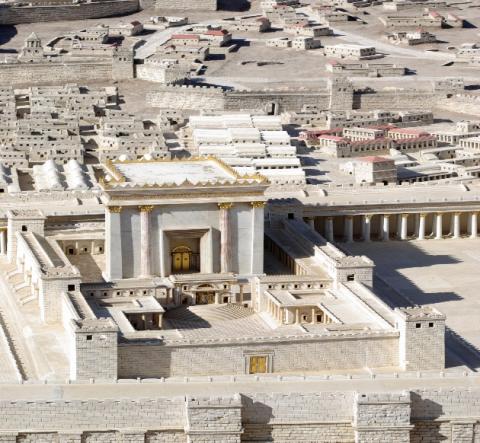Temple Worship
Matthew 12:6
“But I say unto you, That in this place is one greater than the temple.”
In Matthew 12, the Pharisees confront Jesus about His disciples plucking corn and eating it on the Sabbath day. They are accusing Jesus’ Disciples of violating the 4th commandment or sabbath law and because the disciples are Jesus’ servants, they are accusing Jesus of sin. Here is the 4th commandment from Exodus 20:
8) Remember the sabbath day, to keep it holy. 9) Six days shalt thou labour, and do all thy work: 10) but the seventh day is the sabbath of the Lord thy God: in it thou shalt not do any work, thou, nor thy son, nor thy daughter, thy manservant, nor thy maidservant, nor thy cattle, nor thy stranger that is within thy gates: 11) for in six days the Lord made heaven and earth, the sea, and all that in them is, and rested the seventh day: wherefore the Lord blessed the sabbath day, and hallowed it.
This probably wasn’t the first time the religious leaders tried to convict Jesus of violating God’s Law and it is definitely not the last time. A few weeks ago, we did an article about the confrontation Jesus had with the Pharisees in Matthew 23 entitled “Hypocrites”. What makes one a “Hypocrite” is accusing someone else of something you are also guilty of, all the while ignoring your own sin. The Pharisees where guilty of sin. Jesus was not!
In this particular case, neither were Jesus’ Disciples guilty. How could they not be guilty of sin? If you just read the 4th commandment it looks pretty cut and dried, doesn’t it? Once again, the answer lies in the context or “The Rest of the Story”. The Apostle Paul sums up the main purpose of God’s Law for the Galatians when he tells them that “the law was our schoolmaster to bring us unto Christ, that we might be justified by faith.” God, in His infinite wisdom, realized when He made His covenant with mankind that we are all lawyers in our heart and that if given an inch we would take a mile, which is exactly what the Pharisees where doing in this case. Since the rest of the story did not suit the Pharisees’ agenda, they simply ignored it. God had made a provision or amendment to the 4th commandment in Deuteronomy 23 which explicitly covers the situation the disciples are in:
Deuteronomy 23:25 When thou comest into the standing corn of thy neighbour, then thou mayest pluck the ears with thine hand; but thou shalt not move a sickle unto thy neighbour's standing corn.
The Pharisees not only ignored what they did not like about God’s Word, by omission, they also changed God’s word through the deceit of tradition. In a similar situation, the Gospel of Mark details Jesus’ answer as follows:
Mark 7: 5 Then the Pharisees and scribes asked him, Why walk not thy disciples according to the tradition of the elders, but eat bread with unwashen hands? 6) He answered and said unto them, Well hath Esaias prophesied of you hypocrites, as it is written, This people honoureth me with their lips, but their heart is far from me. 7) Howbeit in vain do they worship me, teaching for doctrines the commandments of men. 8) For laying aside the commandment of God, ye hold the tradition of men, as the washing of pots and cups: and many other such like things ye do.
Since Jesus realized the Pharisees knew all these things we have briefly gone over above, Jesus did not approach them by starting at the 4th Commandment nor it’s clarification in Deuteronomy 23. He begins with a precedent set by David, when he entered the Tabernacle or House of God and ate the shew bred. Remember, the Pharisees were looking for a decedent of King David to appear in Jerusalem and reign from the temple in Jerusalem. Does that last sentence sound familiar?
“But I say unto you, That in this place is one greater than the temple.”
To be continued...
- Log in to post comments
